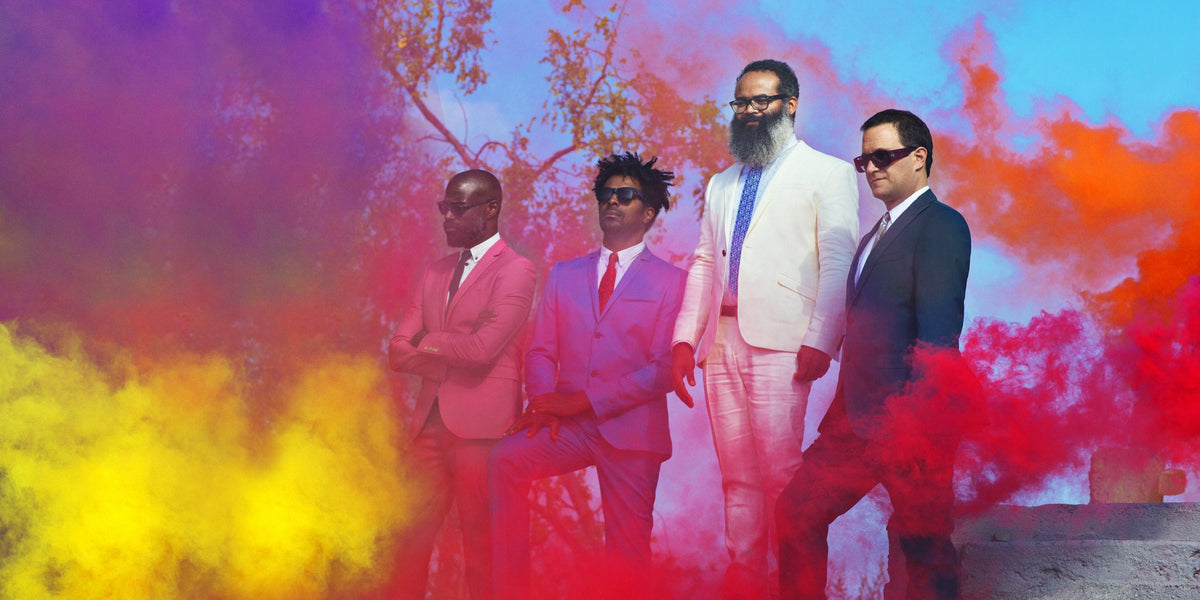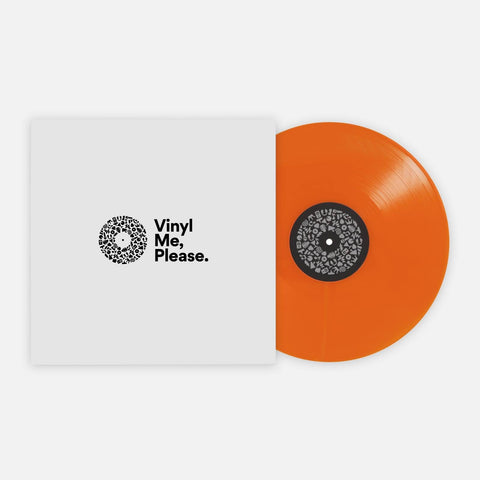Campfire Reveries For The Apocalypse: TV On The Radio’s ‘Return To Cookie Mountain’
Read The Liner Notes For Our New Reissue
Released in America on August 13, 1991, Super Mario World was a launch title for the hotly anticipated Super Nintendo Entertainment System. Super Mario World was — arguably until Super Mario 64 — the best Mario-branded game to be released, a dinosaur-themed escapist masterpiece that allowed players their first opportunity to ride Yoshi, without whom the Mario multiverse would be much different. On the second level of the game’s fourth world, the player encounters multiple mountainous peaks to climb in search of coins and Yoshi Wings, before ending — as all the levels do in Super Mario World — at a giant gate. All told, the level, called Cookie Mountain, is not even in the top 100 things you’d remember from your time playing Super Mario World.
Released in America on September 12, 2006, Return to Cookie Mountain is the second full-length LP from Brooklyn indie rock quintet TV on the Radio. Recorded at guitarist Dave Sitek’s Stay Gold Studios, the album’s 11 songs are nervous, worried, claustrophobic, hopeful, soulful and paranoid. It was heralded upon release by virtually every music publication, including some that don’t even exist anymore. It was named to multiple lists of the Best of the '00s, and it has sold to-date something like 300,000 copies, which seems small, but is vast when you consider it 1) is fundamentally an art rock album and 2) came out in the peak of the illegal download era, before streaming made never owning a physical copy of an album you love less morally bankrupt than it was before.
Return to Cookie Mountain takes its name from the Super Mario World level, obviously, but not in any way that has ever been explained. It’s not like singer Tunde Adebimpe has ever come out as a staunch Nintendo fan who owned a Virtual Boy, or Sitek ever extolled the virtues of royal blue bib overalls. But wanting to return to a fantasy world, where the good guys are plumbers who ride long-tongued dinosaurs and the bad guys are mutated mushrooms and turtles throwing hammers, instead of living in the present of 2006 — with its endless war, its feeling like the end was nigh, and its democratically elected presidents leaving people in their own country to die in a flood — was understandable. Desirable, even.
2006 was a very bad year. Americans were halfway into the second Bush II term, and only months removed from his administration making a defacto public policy to ignore the dying black people in New Orleans during the fallout of Hurricane Katrina, the worst natural disaster to hit America since the colonists made landfall at Plymouth Rock. The war in Iraq, then into its third year, showed no signs of being near a resolution, despite Bush dressing up in pilot cosplay and announcing Mission Accomplished. Everyday brought a new existential worry, a new way the U.S. government had manipulated reporters into backing foreign wars, a new indignity placed upon different parts of the populace. Post-9/11, it felt like we were on the endless conveyor belt to World War III, a multi-front battle that would take our troops from North Korea to Iraq to wherever else the Axis of Evil was deemed to spin. It was a different kind of dread than the one we experience in 2018; it was still novel to believe the U.S. government was on the brink of collapse back then.
In August 2005, shortly after Katrina breached New Orleans’ levees, TV on the Radio — then in the studio working on what would become Return to Cookie Mountain — released a song for free on Touch & Go’s website called “Dry Drunk Emperor.” A fairly sparse track, at least as far as TV on the Radio songs go, it featured lyrics that go “Get him gone” and “Bring all his thieves to trial.”
It was as explicit as TV on the Radio ever got about the man sitting in the White House, but the message was clear: TV on the Radio were writing about the present, and the present had them down. The specter of the world of worries of 2006 hangs over Retrun to Cookie Mountain like ashes. Its first line is “I was a lover, before this war, held up in a luxury suite behind a barricaded door,” and its second song, “Hours,” has this call to lay down arms:
“Refuse these cruel /
Unusual fools /
Leave them to rule /
In hollow point hell.”
These are desperation songs, the full spectrum of post-9/11 anguish and angst distilled into 11 tracks. The most beautiful, resonant song here — “Province” — is about how in uncertain times, the bravest thing you can do as a human is choosing to love someone completely. The song that ended up in Rock Band 2, “Wolf Like Me,” is about how desire — for sex, for power, for success — makes you into a literal animal. The middle of the record is buoyed by songs that sound like they’re being performed by a chain gang in the 7th circle of hell. It’s not light reading.
It’s also the culmination of the arc of New York rock in the '00s — though they got famous in Brooklyn, drummer Jaleel Bunton is a star of Meet Me in the Bathroom for the stories he picked up bartending for the Strokes and others at Max Fish on the Lower East Side, which places TV on the Radio in both lineages — and the start of everything that came after. New York rock in the '00s was initially marked by new bands in the Lower East Side "bringing rock back from the dead"; the decade would close with bands in Brooklyn stretching the fabric of rock into microgenres too vast and varied to describe in any complete way here. That change was largely spearheaded by TV on the Radio, a band who took '70s prog rock, soul, New York punk, noise rock, and instrumental wizardry and melded it into Return to Cookie Mountain, their masterpiece, an album of spiritual campfire reveries for a great cataclysm.
TV on the Radio started as a loft bedroom project between roommates Adebimpe and Sitek, who realized they were kindred spirits when they noticed both of their bedrooms were just mattresses on the ground surrounded by various mediums of art they were working on. They made a noise rock EP called OK Calculator, and distributed it themselves in Williamsburg, even stuffing it into couch cushions in a furniture store. Shortly thereafter, they added Kyp Malone as a vocalist, made another EP, Young Liars, which got released by stalwart indie label Touch & Go, and when that was well-received, it led the band to record their debut LP, Desperate Youth, Bloodthirsty Babes. Desperate Youth was also hotly received, but it was a mark of something bigger percolating; it’s the sound of a band going from being a bedroom concern to something that exists in public.
In the two-year interim between Desperate Youth — which boasted early highlight “Staring at the Sun” — and Return to Cookie Mountain, TV on the Radio became a five piece (they added Gerard Smith on bass and Bunton on drums) and became the least likely art-rock band signed to a major label since, well, Nine Inch Nails signed to Interscope a decade and a half earlier. Interscope — whose most famous artist in that era was Soulja Boy — seemed like an unlikely home for TV on the Radio, but the label gave them resources to do basically whatever they wanted; they got music video budgets and pushes to radio, an inconceivable thing to consider now, and even more so in 2006. “We wanted to reach people who aren’t reading Pitchfork,” Sitek would tell Spin.
A dispute between Touch & Go — still the band’s label outside the states in 2006 — and Interscope meant that Return to Cookie Mountain got a delayed U.S. release date: It came out in the rest of the world on July 6, 2006, but didn’t make U.S. landfall until September. Even with the delay, the album had been part of online music discussion for most of the year by the time it hit U.S. shores; it leaked in spring 2006. It was one of the first albums in the modern indie rock era to be dissected, debated and hyped that far in front of its release date due to a leak; the leak is even mentioned in the Best New Music Pitchfork review of the album. The blognoscenti were unanimous; the album was a big deal. And whoever leaked the album agreed, and highlighted one song specifically: the leaked version was out of order, starting with “Wolf Like Me” instead of “Hours.”
If TV on the Radio are ever enshrined in the Rock & Roll Hall of Fame — and they should be; their catalog doesn’t have a weak link — “Wolf Like Me” will be the music that plays them to the stage. It’s a perfect ideal of TV on the Radio — the howling shoutalong group vocals, the guitar riff played so fast it hits like a Godzilla-based tsunami, the atmosphere that feels so thick you can touch it, the randomly appearing skronking horns, the feeling that everything could fall apart at any second — and its the one TV on the Radio song you could play to someone who hasn’t heard of them that they’ll think totally rips. To date, it’s their only song that breached the top 50 on any Billboard chart (No. 37, Hot Modern Rock Tracks).
An apparently non-apocryphal story says David Bowie’s doorman bought one of Sitek’s paintings in 2003, and Sitek gave him a copy of Young Liars to give to his boss, if he wanted to. The doorman, unlike what virtually everyone else in human existence would have done, actually slipped Bowie the EP, and Bowie listened to it, and became a fan of the band. And that’s how Ziggy Stardust himself ended up deep in the mix — you can hear him best on headphones — lending backing vocals on the choruses of “Province.” It was Bowie’s patron saint of indie rock era, where he blessed young bands like TV on the Radio and Arcade Fire with public boosterism. But hearing him — especially now, considering — on “Province” is a watershed moment, a passing of the torch, a beautiful song made more beautiful by Bowie’s spectral presence. He’s not the only guest vocalist on Return to Cookie Mountain — Celebration’s Katrina Ford pitches in on three songs, while Kazu Makino from Blonde Redhead sings on another — but his appearance on the track gives Return a place in a long lineage of critically and commercially successful art-rock albums. The bridge from Heroes to Cookie Mountain is smaller than you’d think.
While “Wolf Like Me” and “Province” are the twin peaks of Cookie Mountain, the album’s strength is in how it toes the line between subtlety and big, in-your-face moments, not only song-to-song, but in songs themselves. “A Method” goes from a barbershop quartet singing in a bombed-out building to a percussive gunfight at the end. “Let The Devil In” crescendos from Malone singing quietly over a drumline, till it becomes a full-throated, everything-but-the-kitchen sink bang-and-wail. All the group shouts fall away for the album’s penultimate song, “Tonight,” still the most beautiful ballad in the surprisingly deep TV on the Radio ballad songbook — they’ll never get credit for how good their ballads are —a song that reassures you that despite all the dread, and the deals-with-the-devil that are made earlier on the album, you have one life to live, and trying to let things go and living it is all you really have. “Life deals a measly portion, light on good friends and fortune,” Adebimpe sings over a tambourine and droning guitars, before concluding “Your busted heart will be fine, in its tell tale time, so give it up, tonight.” “I think everyone in the band is a closet optimist,” Adebimpe would later tell Spin in a cover story.
And that might be the ultimate message of Return to Cookie Mountain. While the album was created with guitar pedals and ennui, it resolves that to stay alive and sane in the world, you need to believe in love, believe in your ability to overcome your base instincts, believe in the power of being together with other people, and believe in the power of your art to give you personal liberation. A return to the innocence and fantasy of before might not be possible, but this album has no choice but to try.
Andrew Winistorfer is Senior Director of Music and Editorial at Vinyl Me, Please, and a writer and editor of their books, 100 Albums You Need in Your Collection and The Best Record Stores in the United States. He’s written Listening Notes for more than 30 VMP releases, co-produced multiple VMP Anthologies, and executive produced the VMP Anthologies The Story of Vanguard, The Story of Willie Nelson, Miles Davis: The Electric Years and The Story of Waylon Jennings. He lives in Saint Paul, Minnesota.
Related Articles
Join the Club!
Join Now, Starting at $36Pages






